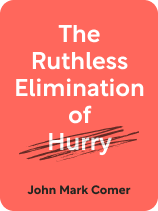

This article is an excerpt from the Shortform book guide to "The Ruthless Elimination of Hurry" by John Mark Comer. Shortform has the world's best summaries and analyses of books you should be reading.
Like this article? Sign up for a free trial here.
Do you feel the need to keep up with everyone else’s fast-paced life? How could you get ahead by actually slowing down?
In The Ruthless Elimination of Hurry, John Mark Comer explains why we rush through life and how such a hurried pace harms us. He provides recommendations on how to slow down in life and, by doing so, get more out of it.
Keep reading to learn how to slow down your life and discover the benefits that you’ll reap from a slower pace.
How to Slow Down in Life
If you want to improve your lifestyle, take Comer’s advice on how to slow down in life. He recommends gamifying patience: making a joyful game out of slowing down. He says that gamification will motivate you to slow down your life.
(Shortform note: Some research supports Comer’s claim that gamification boosts motivation; for instance, one study found that gamification in classrooms improves motivation and learning.)
For example, Comer suggests that you make a game of reducing your phone use. Phone addictions make you rush because phones pack your day with meaningless activities (such as fast-paced games and checking social media alerts). Therefore, reducing your phone use through gamification can slow you down and make your life more meaningful. Comer says you can do so by creating phone-related rules and challenging yourself to follow those rules.
(Shortform note: While Comer discusses how reducing your phone use can slow down your life, he doesn’t explore in depth the connection between phone use and patience. Some research suggests that frequent smartphone use is linked to impatience and impulsive behavior. However, this research looks at correlation rather than causation—in other words, it doesn’t explore whether impatience and impulsivity cause frequent smartphone use or whether smartphone overuse causes impatience and impulsivity.)
Comer suggests that you make a game of only engaging with technology during specific, scheduled times. Consider scheduling one time of day when you can check social media and another time when you can check your email. That way, you won’t waste too much time on either action. Comer says you can make this a game by setting ambitious rules and challenging yourself to stick to them—for example, setting the rule that you can only check social media from 5 to 6 p.m.
(Shortform note: Comer’s advice on limiting your technology use may be easier to follow with the help of apps that personalize the process of restricting your phone use. For instance, the app Offtime creates different modes on your phone, such as a “work mode” and a “family mode.” Each mode allows access to only some phone functions at certain times, which may make it easier to use your phone time wisely—for instance, not checking social media when it’s your email-checking time.)
The Benefits of Slowing Down
How will it benefit you to slow the tempo of your daily life? Comer explains that slowing the pace of your daily life increases your patience. If you eliminate the pressure of speed, you’ll no longer feel impatient when events in everyday life take a while. Comer insists that increased patience will improve your health, relationships, and spirituality. Let’s further explore each of these benefits.
First, patience helps you feel more relaxed. When you move at a slower pace, you’re less stressed, and this is good for your mental health.
(Shortform note: Exercise may be a way to accomplish this same goal. In addition to boosting your physical health, exercise can relax you and support your mental health. Physical movement stimulates the production of endorphins, chemicals that make you feel relaxed and optimistic—two emotions that also boost your mental well-being.)
Second, when you’re more patient, you treat others better. This improves your relationships. For instance, you won’t snap at your server if they take a while to bring out your food at a restaurant, and you won’t get angry at your child when they take a while to complete their chores.
(Shortform note: Learning to be more patient may be particularly important if you’re a caregiver for one or more seniors. Older people sometimes resist caregiving because it involves accepting that they’re less independent than they used to be, and managing this resistance requires patience. In addition to following Comer’s advice, you can have patience when caring for seniors by 1) offering help rather than making demands, and 2) taking care of yourself so you can remain calm and gentle (which keeps your relationship positive) if the senior you’re helping resists some of your efforts.)
Third, patience provides you with opportunities for spiritual contemplation. While you’re waiting patiently—such as standing in a long line at the post office—you’ll have the opportunity to pray to God. This will improve your relationship with him.
(Shortform note: In addition to increasing the quantity of your spiritual contemplation by following Comer’s advice, you may be able to improve the quality by being patient with yourself. In The Book of Joy, the Dalai Lama and Archbishop Desmond Tutu describe the ability to pray as a muscle that you need to build. Deep prayer and meditation don’t come naturally to most—these types of contemplation take time, effort, and patience.)
| Patience May Also Boost Happiness and Productivity In Four Thousand Weeks, Burkeman shares Comer’s assertion that it’s worthwhile and possible to gradually increase your patience for slow-paced moments in life, and he adds that increasing your patience in everyday life specifically improves your happiness and your productivity. First, Burkeman explains that when you no longer expect yourself to be speedy—in other words, when you treat yourself with patience—you free yourself from others’ expectations of you. This freedom boosts your happiness. Second, he explains that people who are patient avoid rushing through tasks, and in doing so, they avoid burnout. Burnout halts productivity; by avoiding it, you can stay productive. |

———End of Preview———
Like what you just read? Read the rest of the world's best book summary and analysis of John Mark Comer's "The Ruthless Elimination of Hurry" at Shortform.
Here's what you'll find in our full The Ruthless Elimination of Hurry summary:
- Our cultural obsession with rushing and how it's harmful in many ways
- How to stop rushing by deepening your Christian spiritual practice
- How to carve out more time for your spiritual practice






